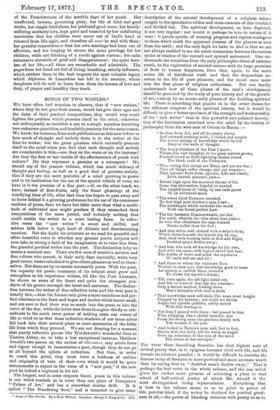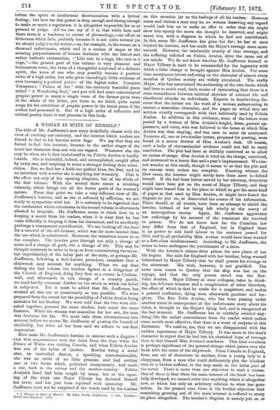SONGS OF TWO WORLDS.*
WE have often had occasion to observe, that if "new writers," where they do not give their names, would but give their ages and the dates of their poetical compositions, they would very much lighten the problem which presents itself to the critic, otherwise not unfrequently as insoluble a one as a single equation involving two unknown quantities, and insoluble precisely for the same reason. We know, for instance, from such publications as this now before us how much of thought and melody there is in the writer at the time he writes ; but the great question which naturally presents itself to the mind when you find that such thought and melody are considerable is this,—are they on the wane or on the increase? Are they the first or last results of the effervescence of youth with culture ? Do they represent a promise or a retrospect ? We should say of the present volume, which has much delicacy of thought and feeling, as well as a good deal of genuine melody, that if they are the mere preludes of a mind growing in power
and in its inclination for the use of the special vehicle of verse, we have in it the promise of a fine poet :—if, on the other hand, we have, instead of first-fruits, only the finest gleanings of the versifying time of life, after that time has begun to pass away and to leave behind it a growing preference for the use of the commoner medium of prose, then we have but little more than what a multi- tude of cultivated men might produce if they ransacked their compositions of the same period, and certainly nothing that could entitle the writer to a more lasting fame. In reflec- tive verse the " new writer " is sweet and skilful, and seldom falls below a high level of delicate and discriminating emotion. But the doubt we entertain as we read his graceful and often beautiful verse is whether any greater poetic subjects will ever take so strong a hold of his imagination as to raise him from the graceful poetical writer into the poet. The distinction is by no means a nominal one. There are few men of sensitive natures and fine culture who cannot, in their early days especially, write very good verses, verses calculated to give others pleasure as well as them- selves. But these are by no means necessarily poets. With the poet, the capacity for poetic treatment of his subject must grow and strengthen as his experience widens, till like the Poet Laureate, he shows us some of the finest and quite the strongest pro- ducts of his genius amongst the latest and matured. The distinc- tion between the writer of fine reflective verse and the true poet is - usually this,—that the former only gives a more melodious and per- fect utterance to the fears and hopes and doubts which haunt us all, and are sure to find their way as much into the prose as into the verse of the day, while the latter uses those thoughts chiefly as sub- ordinate to the much rarer power of making some one corner of life so vivid to us that these reflective shadows of our inner selves fall back into their natural place as mere accessories of the fuller • life from which they proceed. We are not denying for a moment
that purely reflective poems like Wordsworth's wonderful lines at Tintern Abbey, or, to take a less exceptional instance, Matthew Arnold's two poems on the author of Obennann, may attain force and vigour enough to immortalize a poet, though they do not go at all beyond the sphere of reflection. But then, in order to reach this point, they must have a boldness of outline and originality of tone of their own which it would be quite unreasonable to expect in the verse of a " new poet," if the new poet be indeed a beginner in his art.
The longest, and in some respects finest, poem in this volume is one which reminds us in more than one place of Tennyson's "Palace of Art," and has a somewhat similar drift. It is . called "The Wandering Soul," and is intended to give some
* Songs of Two Worlds. By a New Writer. London: Henry S. King & Co. 1871.
description of the natural development of a religious nature caught in the speculative eddies and cross-currents of this troubled and divided day. The spiritual development, as here depicted, is not very regular; nor would it perhaps be true to nature if it were ; it paints epochs of seeming progress and regress analogous to those which mark the apparent courses of the planets as seen from the earth ; and the only fault we have to find is that we are not always enabled to see the exact connection between the various cycles or reaches of the onward and upward movement. One un- derstands the transition from the early philosophic thirst of extreme youth, to the exploration of natural science with its large promises of fruit to human happiness, from that, again, to the more active life of beneficent work, and then the despondent re- action to the life of pure pleasure, and the recoil once more into the first phase of religious enthusiasm. But one hardly understands how all these phases of the soul's development should be preceded by the study of pure history and of the growth of art,—surely by no means early phases of the budding spiritual life. There is something that puzzles us in the order chosen for the different chapters of the spiritual history, but it would be difficult to give a better specimen of the strength and workmanship of the " new writer" than in this powerful and polished descrip- tion of the fascination exercised over the mind by the history of philosophy from the wise men of Greece to Bacon :—
"So then from Art, and all its empty shows And outward-seeming truth, I turned and sought The secret springs of knowledge which lie hid Deep in the wells of thought.
" The hoary thinkers of the Past I knew ;
Whose dim vast thoughts, to too great stature grown,
Flashed round as fitful lightning flashes round The black vault of the Unknown.
" Who, seeing that things are Many, and yet are One ; That all things suffer change, and yet remain— That opposite flows from opposite, Life and Death, Love, hatred, pleasure, pain- ' Raised high upon the mystical throne of life Some dim abstraction, hopeful to unwind The tangled maze of being, by one rude guess Of an untutored mind.
"The sweet Ideal Essences revealed, To that high poet-thinker's eyes I saw ; The archetypes which underset the world With one broad perfect Law.
"The fair fantastic Commonwealth, too fair For earth, wherein the wise alone bore rule— So wise that oftentimes the sage himself Shows duller than the fool ; " And that white soul, clothed with a satyr's form, Which shone beneath the laurels day by day, And, fired with burning faith in God and Right, Doubted men's doubts away ; " And him who took all knowledge for his own, And with the same swift logical sword laid bare The depths of heart and mind, the mysteries Of earth and sea and air ; " And those on whom the visionary East Worked in such sort, that knowledge grew to seem An ecstasy, a sudden blaze, revealed To crown the mystic's dream ;
" Till, once again, the old light faded out, And left no trace of that fair day remain— Only a barren method, binding down Men's thoughts with such a chain
" That knowledge sank self-slain, like some stout knight Clogged by his harness; nor could wit devise Aught but ignoble quibbles, subtly mixed With dull theologies.
" Not long I paused with these ; but passed to him Who, stripping, like a skilful wrestler, cast From his strong arms the precious deadly web, The vesture of the past.
"And looked in Nature's eyes, and, foot to foot, Strove with her daily, till the witch at length Gave up, reluctant, to the eyes of the mind The secret of her strength."
The verse there describing Socrates, has that highest note of critical poetry that, in it, epigram becomes vivid with life, and life reveals ita inherent paradox ; it would be difficult to describe the famous irony of Socrates in more poetical and more accurate words than by saying that he "doubted men's doubts away." That is perhaps the best verse in the whole volume, and the one which gives the author most promise of achieving a place in that school of half-critical poetry of which Mr. Arnold is the
most distinguished living representative. Everything that is best in the volume seems to us to point to power of this peculiar kind, if the writer be destined for poetical great- ness at all,—the power of blending criticism with poetry so as to
infuse the spirit of intellectual discrimination with a lyrical feeling ; but how far this power is deep enough and strong enough to make or merit a reputation it is altogether impossible for us at present to judge. All we can say of it is, that while here and there there is a tendency to excess of phraseology,—an effort at bitterness which fails, probably because it is not quite natural (as we should judge) to the writer,—as, for example, in the verses on a drowned unfortunate, which end in a scream of anger at the seeming purposelessness of human destinies with the forced and rather bathotic exclamation, " Like rats in a cage, like rats in a cage,"—the greater part of this volume is very pleasant and -harmonious verse, the verse of a thoughtful mind and of a delicate spirit, the verse of one who may possibly become a poetical -critic of a high order, but who gives exceedingly little evidence of ever becoming a poetical painter of the higher order. Compare Tennyson's " Palace of Art " with the certainly beautiful poem -called " A Wandering Soul," and you will find more concentrated graphic power in many a single verse of the former poem than in the whole of the latter, yet there is, we think, quite equal -scope for the exhibition of graphic power in the latter poem if the author had possessed it. But of a high order of reflective and critical poetry there is real promise in this book.



































 Previous page
Previous page